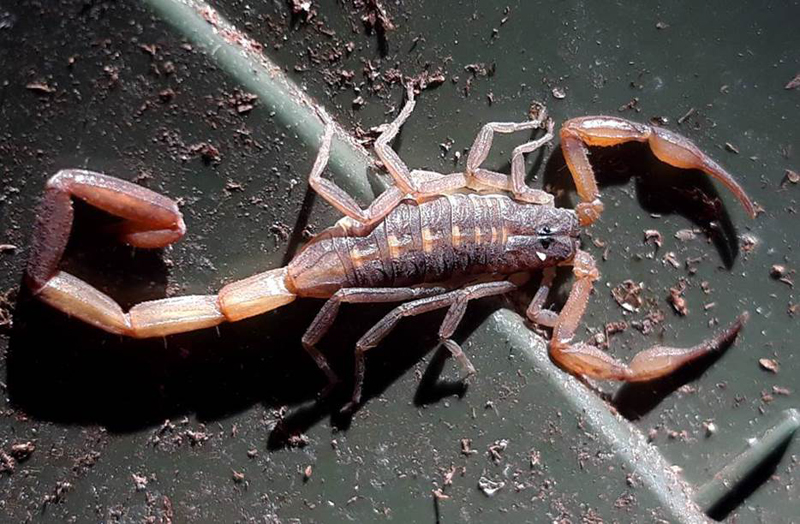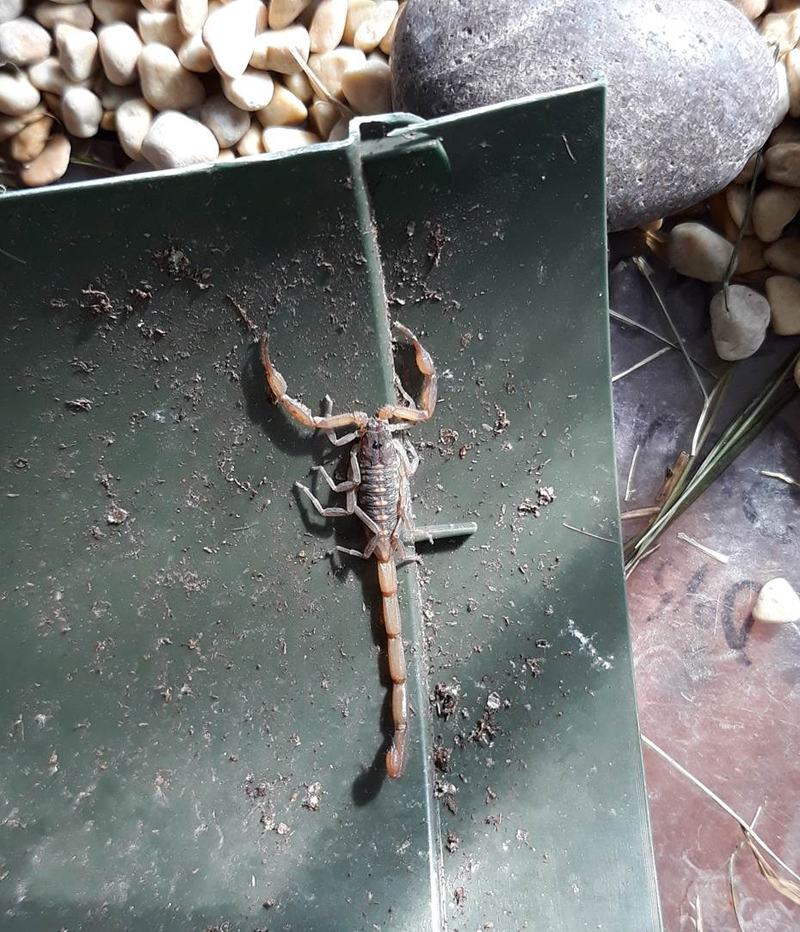Staff Commended After Capturing Scorpion
A scorpion was discovered in Bermuda earlier this month, thought to be accidentally brought into Bermuda on cargo, and Fast Forward Freight staff have been “commended on their swift actions in preventing the escape of this scorpion.”
On October 12th, employees of Fast Forward Freight saw the scorpion in one of their warehouses, captured it and contacted officers at the Department of Environment and Natural Resources who promptly collected it and checked the premises for additional scorpions. None have been found to-date.
“The staff of Fast Forward Freight are to be commended on their swift actions in preventing the escape of this scorpion and bringing it to the attention of the Department of Environment and Natural Resources,” said Wildlife Ecologist at the Department of Environment and Natural Resources Mark Outerbridge.
“Vigilance at the point-of-entry, good communication, early detection and rapid response are critical components of invasive species management and are essential in preventing the establishment of exotic invasive alien species.”
A Ministry spokesperson said, “Although species identification has yet to be confirmed by experts, the scorpion is believed to be the striped bark scorpion [Centruroides vittatus] and measured 32 mm total length. Adults of this particular species can grow up to 75 mm TL, so the Bermuda specimen was only half-grown.
“The striped bark scorpion is native to North America and is commonly found throughout the south-central United States and northern Mexico. It is perhaps the most frequently encountered scorpion in the USA. The striped bark scorpion has a very diverse diet, consuming spiders, centipedes, crickets, flies, beetles, and other small insects.
“They hunt and feed at night but rest during the day in cracks and crevices, under rocks and surface debris, within vegetation, and inside buildings. These scorpions are capable of living in close association with humans and can inflict a painful sting which causes swelling and nausea, but rarely is it lethal to humans.
“Scorpions do not presently live in Bermuda. The striped bark scorpion has been described as a highly adaptive species that can tolerate different climatic conditions, suggesting that this scorpion might easily adapt to life on Bermuda if given the chance to become established.
“Invasive alien species are defined as being non-native, have the ability to become established in a new environment and subsequently multiply at which point they are highly likely to cause damage to natural ecosystems, cause economic harm and even threaten human health.
“The adverse impacts of invasive species are considered to be the single greatest threat to island native biodiversity because island species have evolved largely in the absence of mainland predators, heavy competition, diseases and the need for life history traits such as earlier age of first reproduction.
“Island species can readily fall victim to invasive alien species, making easy prey, succumbing to the diseases they carry, and failing to effectively compete for resources like food and shelter. Invaders, on the other hand, encounter better resources, fewer natural enemies and a more advantageous physical environment to live in.
“As a result, they not only displace native species, but can also alter whole ecosystems by disrupting ecosystem services, changing light levels and soil chemistry, affecting nutrient cycling, competing for limited resources and acting as predators. Aside from their negative impacts on native biodiversity, invasive alien species often impose an economic cost on agriculture, fisheries and infrastructure.”
Read More About
Category: All, Environment, News





32mm long.
Hmmm..when did Bermuda switch from US/Imperial to metric measurements?
You and I both know that reporting on a “Scorpion over a foot long” would cause mass panic. Better to keep the size abiguous to most of us.
32mm is a little under and inch and a half.
See!!
Bermuda is very confused when it comes to US Imperial/Metric
When it comes to the roads we use metric and construction we use Imperial…we also use imperial for weather.
Bermuda’s been on metric for decades. Because of the American influence, we still tend to switch to US measurements for common use – feet and pounds or fahrenheit for example. But look at our gas (or petrol if you prefer)… prices are per litre, not gallon.
* But look at our gas (or petrol if you prefer)… prices are per litre, not gallon.*
That’s because way back when Gov’t figured out that locals would still think their gas was cheap . At today’s current $2.20 a litre when converted to Imperial gallons most people would S**t a brick if they knew it was $9.80 .
Very true, but milk is more expensive, water too if bought at certain retail outlets.
Oh , trust me , I’ve given thought to those things before as well .
As one (ridiculous) example , if a truckload of water was priced the same per gallon as what we willingly pay for for a 3-5 gallon bottle of ‘pure water’ that’s ‘brewed’ somewhere near Devonshire Marsh a truckload of it would cost near $3000
Well this is their Zodiac month.
Mmmmmm
Well, it is Scorprio season after all! All kidding aside, I’ve been stung by one of those things and it was incredibly painful. Glad it was caught and hopefully no others got away.
Bermuda is a very dangerous place now,
centipedes,snakes,now a scorpion,not to mention drug dealers.
He must heard about the bitcoin or maryjane
There was a Black Widow, a few snakes and now a scorpion? Who know if that was a decoy for his other cousins to slip through…
We may have to start gassing these containers before being off loaded from the boat. Good way of stopping all the migrating rats too..
Honestly not a bad idea.
Commenter “Whistling Frog” has a brilliant and EXCRUCIATINGLY VITAL AND VALID POINT and SUGGESTION WHICH SHOULD BE TAKEN TOTALLY SERIOUSLY: ➡️➡️GAS THESE INCOMING CONTAINERS ➡️➡️BEFORE THEY ARE BROUGHT ONTO THE ISLAND FROM THE SHIPS: the scorpion, the black widow spider which was found, centipedes, snakes, and all other threats to the endemic creatures and huge threats to Bermuda’s ecosystems, must be stopped BEFORE they do escape, multiply, and cause irreversible massive damage to Bermuda’s delicate and safe and vitally important ecosystems and species!